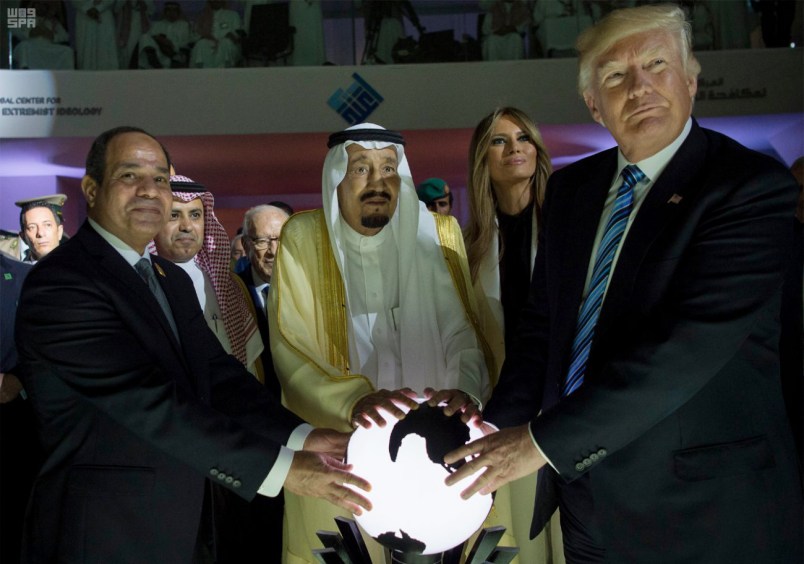Remember President Trump’s big, triumphant arms deal in Saudi Arabia? It turns out it didn’t really happen. It was Trump’s own fake news, a feat of supply chain vertical integration and more importantly for the MAGA agenda repatriating jobs from Russia. In all seriousness, at the end of the day it didn’t happen. There are no contracts or sales. At all.
So how could this be? The story comes from Bruce Riedel, a longtime CIA and national security official, now at Brookings. The Potemkin deal turns out to be remarkably similar to the Trump jobs announcements we’ve grown accustomed to. Trump takes a bunch of jobs or investments which either already exist or have already been announced and rebrands them as new economic growth driven by Trump Power. In this he usually has a compliant and complicit CEO, happy to go along with the charade to curry favor with the US President.
Here’s what Riedel discovered …
I’ve spoken to contacts in the defense business and on the Hill, and all of them say the same thing: There is no $110 billion deal. Instead, there are a bunch of letters of interest or intent, but not contracts. Many are offers that the defense industry thinks the Saudis will be interested in someday. So far nothing has been notified to the Senate for review. The Defense Security Cooperation Agency, the arms sales wing of the Pentagon, calls them “intended sales.” None of the deals identified so far are new, all began in the Obama administration.
As I said, this turns out to be remarkably similar. The $110 price tag advertised by the Trump White House includes no actual contracts, no actual sales. Instead it is made up of a bundle of letters of intent, statements of interest and agreements to think about it. In other words, rather than a contract, it’s more like a wishlist: an itemized list of things the Saudis might be interested in if the price of oil ever recovers, if they start more wars and things the US would like to sell the Saudis.
Here’s one illustrative example from Riedel …
An example is a proposal for sale of four frigates (called multi-mission surface combatant vessels) to the Royal Saudi navy. This proposal was first reported by the State Department in 2015. No contract has followed. The type of frigate is a derivative of a vessel that the U.S. Navy uses but the derivative doesn’t actually exist yet. Another piece is the Terminal High Altitude Air Defense system (THAAD) which was recently deployed in South Korea. The Saudis have expressed interest in the system for several years but no contracts have been finalized. Obama approved the sale in principle at a summit at Camp David in 2015. Also on the wish list are 150 Black Hawk helicopters. Again, this is old news repackaged. What the Saudis and the administration did is put together a notional package of the Saudi wish list of possible deals and portray that as a deal. Even then the numbers don’t add up. It’s fake news.
As I said, it’s remarkably like the Trump-branded phony job announcements: earlier plans, themselves not committed to, rebranded as new decisions, with the Saudis happy to go along with the charade to curry favor with the President who loves whoever showers praise on him.
Let’s note for the record that the underlying reality here isn’t necessarily bad news. It’s quite debatable whether we should be selling massive amounts of new arms to Saudi Arabia. But we should know whether or not it happened.
What actually strikes me about this is not so much the Trump Team’s deception. That’s really expected at this point. What’s remarkable is that we’re only finding out about this, not from a news organization or reporter, but from a national security hand who did his own poking around. This isn’t a secret conversation or classified project. When you make a deal with a price tag over $100 billion it creates a trail. Why didn’t reporters on the national security beat figure this out?
That’s a good question I’m very curious to see an answer to. But I’m not saying those reporters are lazy or necessarily goofed, though perhaps they did both. Remember, the Trump team has gone to great lengths to limit what were once considered routine elements of press access. This doesn’t mean it’s impossible to figure these things out. But it may be considerably harder. Also important, there may be a slow uptake issue, a failure to adjust expectations to a properly Trumpian frame. If the President announces a major news arms sale to a foreign autocracy, do you assume it’s false until you see the contracts? It would seem the answer to that is likely “yes.”






